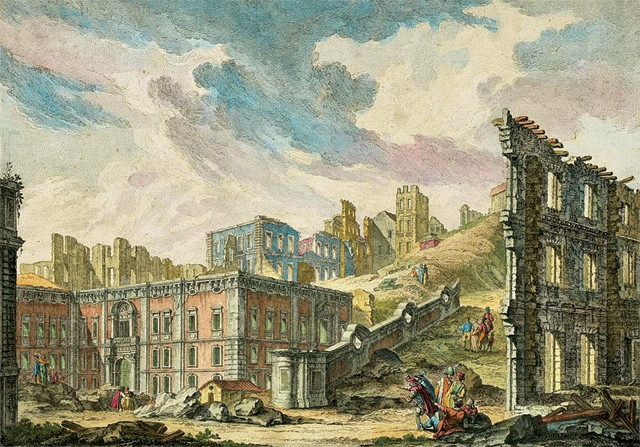
by Lucas Joel Friday, October 23, 2015

Ruins of the Patriarchal Church Square after the earthquake. Credit: Jacques-Philippe Le Bas.
The quake occurred on All Saints’ Day, and it destroyed almost every major church in Lisbon. This sparked debate among theologians about whether disasters like earthquakes were acts of divine judgment, or whether they should be seen more as indiscriminate natural phenomena.
Voltaire, the Enlightenment-age writer, composed a poem titled Poème sur le Désastre de Lisbonne (Poem on the Lisbon Disaster) soon after the quake. The poem is regarded as an attack on the philosophical concept of optimism, which was popular at the time. The first few stanzas of the poem read:
Unhappy mortals! Dark and mourning earth! / Affrighted gathering of human kind! / Eternal lingering of useless pain! / Come, ye philosophers, who cry, “All’s well!” / And contemplate this ruin of a world. / Behold these shreds and cinders of your race, / This child and mother heaped in common wreck, / These scattered limbs beneath the marble shafts — / A hundred thousand whom the earth devours / Who, torn and bloody, palpitating yet, / Entombed beneath their hospital roofs, / In racking torment end their stricken lives.
The fourth stanza — Come, ye philosophers, who cry, “All’s well!” — is a reference to philosophers like Alexander Pope, who claimed that the universe is an inherently good place. The quake and the suffering it brought about spurred philosophers like Voltaire to challenge such optimism-based notions about the world. Pope argued that all perceived evil would appear good if we understood the greater meaning of the universe. Voltaire challenged this by asking, for instance, why the world would not be a better place without the earthquake. The quake, and the effects it had on Voltaire’s thinking, would later be displayed prominently in the writer’s famous satire of optimism, “Candide.”
© 2008-2021. All rights reserved. Any copying, redistribution or retransmission of any of the contents of this service without the expressed written permission of the American Geosciences Institute is expressly prohibited. Click here for all copyright requests.